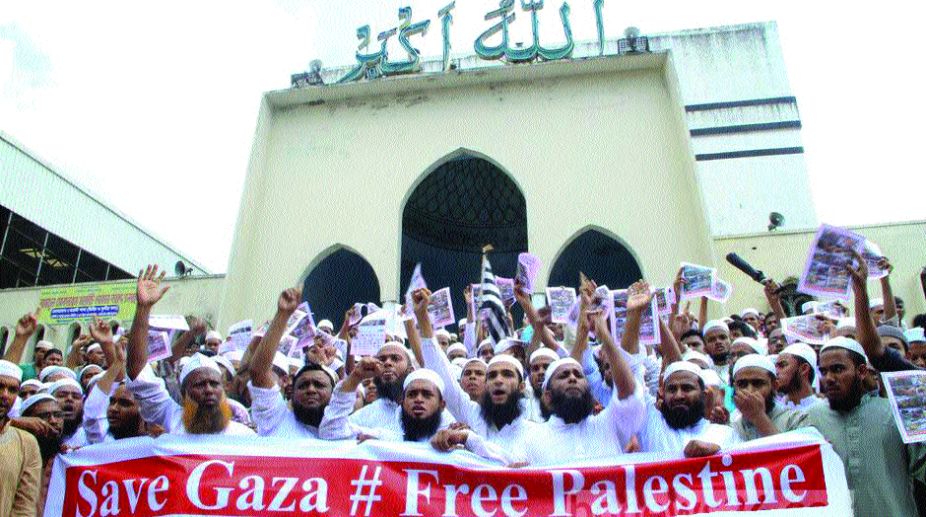President Donald Trump’s decision to shift the US diplomatic mission from Tel Aviv to Jerusalem has caused, on expected lines, huge furore amongst Palestinians and the entire Muslim world opposed to Israel. Israelis are naturally very upbeat with the announcement as it not only endorses their stand but also vindicates the decades-old Israel policy of legitimising Jerusalem as the hub of diplomatic activity.
The fact that Jerusalem-linked reverberations would ever irk Bangladesh was perhaps not really anticipated by security analysts. On 8 December, after Friday prayers, Hefazat e Islam, the outfit comprising violent zealots, held a demonstration in front of the famous Baitul Muqarram mosque, Dhaka, protesting against the US diplomatic mission being moved to Jerusalem. There were massive crowds and the protest, organised by a fundamentalist organisation, speaks volumes about bigots’ ire in Bangladesh.
Hefazat e Islam has now given a call to lay siege to the US embassy in Dhaka on December 13 signalling that the Muslims in this part of the world want to be in the forefront of an agitation on the issue of Jerusalem and exploit this development for domestic advantage and for political gains. The anti-Israel and anti-US initiative also sends out a warning to the thousands of liberals in Bangladesh that ‘Hefazat ‘ is still a force to reckon with.
The question now arises as to why ‘Hefazat’ of all groups decided to organise the demonstrations and siege. This ten-year-old fundamentalist organisation has been looking for opportunities to exploit. It was hardly three years old when Bangladesh liberals took to street protests in 2013 against the wanton killings of bloggers, academics and liberals . Hefazat played a crucial role in clashing with the establishment, implying its support to the killers and intensifying its demand for imposition of Sharia law in Bangladesh. By such a step, it made its presence felt in mainstream Bangladesh. It succeeded or seemed to occupy a political space as the old Jamaat e Islami (JeI) stands banned and Hefazat possibly wants to emerge as an alternative to the JeI as a counterweight to Sheikh Hasina and her Awami League. Clearly, the plan is to ensure that Hasina does not get secular, liberal or for that matter pro-India.
Not very long ago, Hefazat was in focus when it successfully launched a movement to remove the statue of the Greek goddess adorned in front of the Dhaka Supreme Court, describing it as a symbol of Hindu culture as the goddess was depicted wearing a saree. Also, an idol was thought to be anti Islam. Through these machinations, Hefazat asserted itself as a force to reckon with. By such actions, it earned the support of international fundamentalist Muslim organisations and drew close to Al Qaida and possibly ISIS. Also , it could register its presence in the South Asia and South East Asia region in an apparent bid to unite the Muslim populace in the vicinity. Many in Malaysia, Indonesia, Southern Thailand and parts of Philippines are easily won over by such gesticulations in a country like Bangladesh.
Coming back to the Hefazat threat to lay siege to the US embassy in Dhaka, and even if it’s a veiled threat, it should be taken with all seriousness as it speaks about an outfit posing a direct challenge to the secular Bangladesh government and to the Trump administration. The attempt could be foiled by the authorities. The political calculation clearly is to get reactionary and fundamentalist forces in Bangladesh to unite for the Jerusalem cause, divide society along and keep the Hasina government on tenterhooks.
The Bangladesh Nationalist Party (BNP) would love to use this development to its advantage as the party is going through a really bad patch these days. The Global Intelligence Media network, a Canadian news channel plus Saudi authorities have recently alleged that BNP chairperson Khaleda Zia, already battling for her political survival due to several graft charges, is involved in cases of money laundering, bribery and other nefarious deals with a humungous investment of $12 million in Saudi malls and other infrastructure in some middle-eastern countries. Reeling under such severe charges abroad, and facing graft allegations in Bangladesh Khaleda is on the back foot. They also dent the battered image of her exiled son Tareq Rahman, now sheltered in the UK.
Hence to retrieve her and her party’s sullied image, Khaleda may now opt to join the Hefazat bandwagon whether through street protests or by joining a siege.
For a beleaguered politician who was twice Prime Minister and with known links to religious and anti-India zealots, it is difficult to survive as a recluse for long. More so, when she is ageing and has no clear successor in sight. Thus Khaleda may clutch on to anything that brings her out of political wilderness, regardless of the relative merits of the cause. After all, she had governed her country in partnership with the Jamaat for two spells. This collaboration saw a visible growth in fundamentalism in Bangladesh .
The threat of laying siege to the US mission in Dhaka and intermittent violent protests are ominous signs reminding us of the rise of the Jamaat in Pakistan in the early years after its independence. The situation, therefore, calls for unity among the secular forces in Bangladesh to thwart the growth of fundamentalism on the pretext of Jerusalem or any other issue. The coming months look critical for Dhaka.
The writer is a retired IPS officer and a security analyst who was posted in Dhaka. The views are personal.










